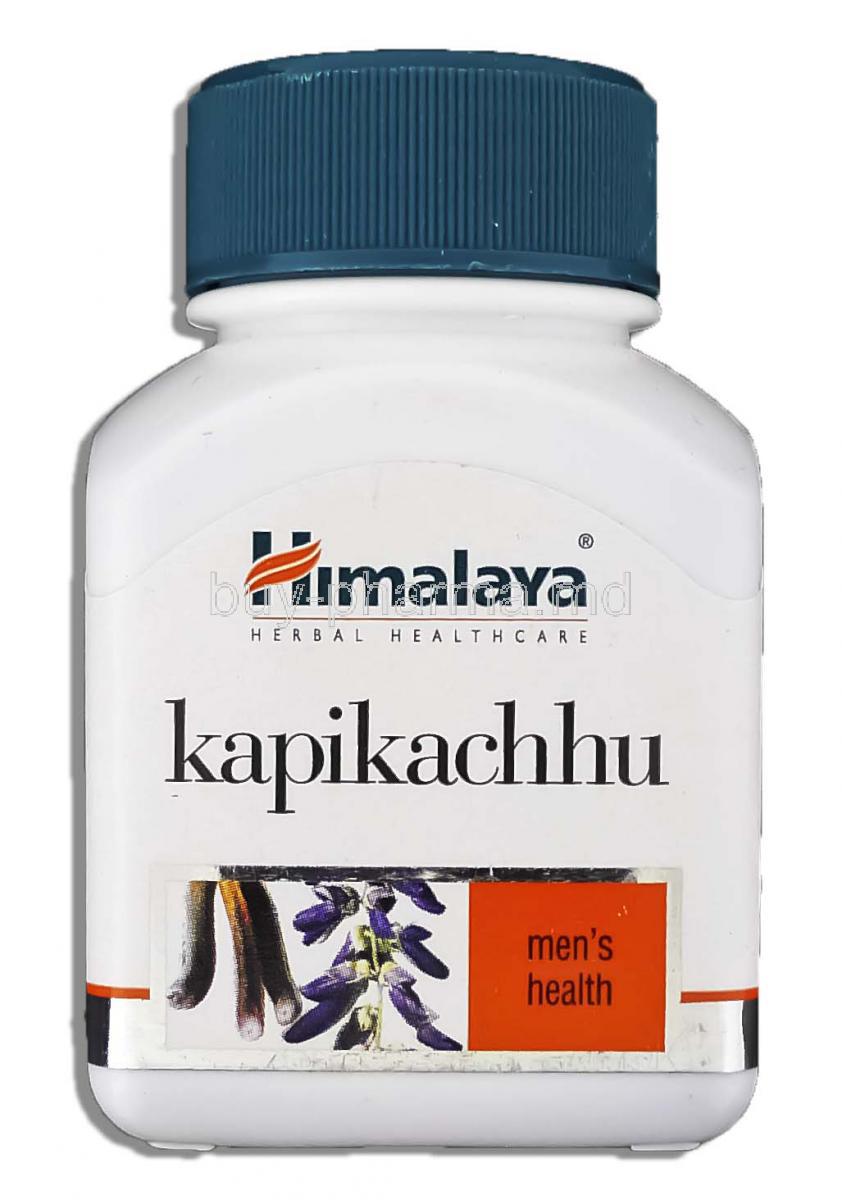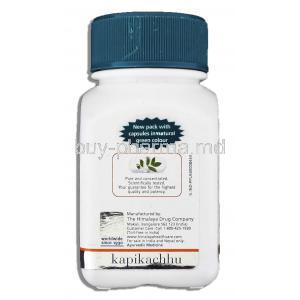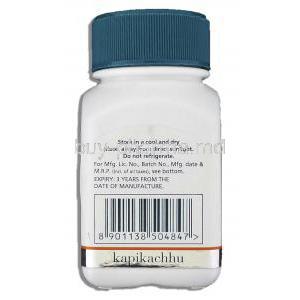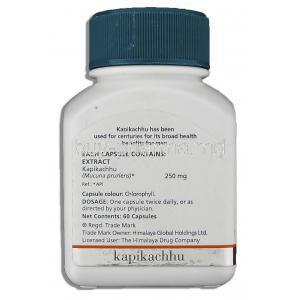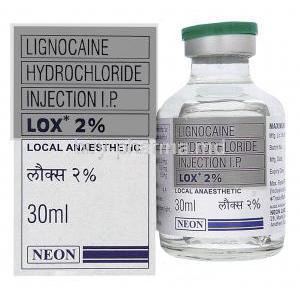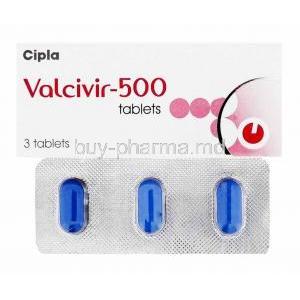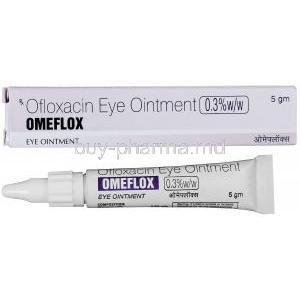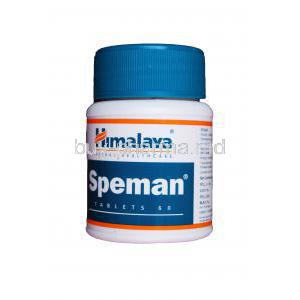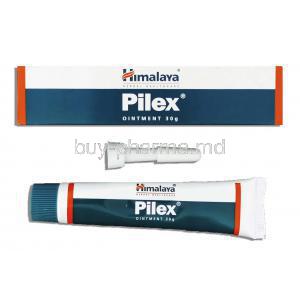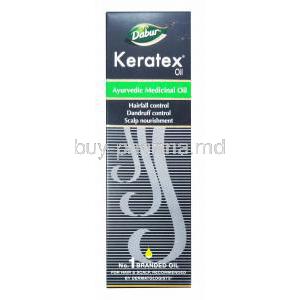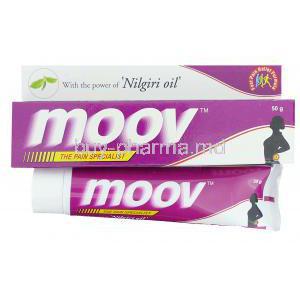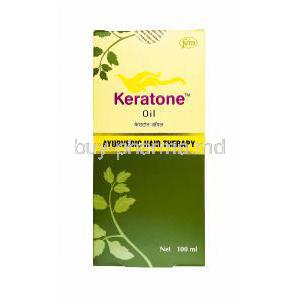1. Introduction to Himalaya Kapikachhu for Men's Health
Overview of Himalaya Kapikachhu
Himalaya Kapikachhu is a standardized herbal supplement formulated using **Mucuna pruriens**, a tropical legume revered in Ayurveda. This natural remedy is positioned at the intersection of traditional botanical science and modern health needs—particularly in male vitality and reproductive function.
Historical and Traditional Ayurvedic Use of Kapikachhu (Mucuna pruriens)
Kapikachhu has a legacy dating back centuries. In classical Ayurvedic scripts, it is known for:
- Enhancing Shukra Dhatu (reproductive tissue)
- Pacifying Vata dosha imbalances
- Acting as a nervine tonic and aphrodisiac
Its seeds were often ground into pastes or powders to address conditions like premature ejaculation, oligospermia, and mental debility.
Importance of Kapikachhu in Male Reproductive and Neurological Health
Modern ethnopharmacology validates many of its traditional uses. Kapikachhu supports the hypothalamic-pituitary-gonadal axis, aiding in: - Testosterone regulation - Spermatogenesis - Dopaminergic function in the brain
Key Benefits Promoted by Himalaya’s Formulation
Himalaya's product emphasizes purity and potency, promoting benefits such as:
- Improved semen quality and libido
- Reduction in stress-induced sexual dysfunction
- Neurological support for cognitive clarity
2. Composition and Active Ingredients
Botanical Source: Mucuna pruriens Extract
Derived from the seeds of **Mucuna pruriens**, this formulation utilizes bioactive components, chiefly **L-3,4-dihydroxyphenylalanine (L-DOPA)**.
Standardized L-DOPA Content and Other Phytonutrients
Each capsule contains a measured dose of **standardized L-DOPA**, a precursor to dopamine, essential for mood and motor control. Other constituents include alkaloids, tannins, and saponins—synergistically enhancing efficacy.
Excipients and Formulation Details
The excipients are minimal, ensuring bioavailability: - Microcrystalline cellulose - Magnesium stearate (vegetable grade) - Natural capsule shell (plant-based)
Natural and Vegetarian-Friendly Components
Completely free from animal derivatives, artificial preservatives, and synthetic binders, making it suitable for vegetarians and those with dietary sensitivities.
3. How Himalaya Kapikachhu Works: Mechanism of Action
Role of L-DOPA in Dopamine Synthesis and Nervous System Support
L-DOPA converts into dopamine, a neurotransmitter critical for: - Mood regulation - Reward-motivation behavior - Neuromuscular coordination
Enhancement of Testosterone and Libido Through Hormonal Modulation
By influencing the **pituitary-gonadal axis**, Kapikachhu promotes luteinizing hormone release, thereby stimulating endogenous testosterone production—an essential determinant of male sexual function.
Effects on Sperm Quality and Motility
Research has shown:
- Increased sperm concentration
- Improved motility and morphology
- Enhanced seminal volume
Neuroprotective and Mood-Enhancing Properties
The antioxidant flavonoids present in Kapikachhu neutralize free radicals, preserving neuronal integrity and alleviating oxidative stress-induced cognitive decline.
4. Primary Uses of Himalaya Kapikachhu for Men's Health
- Support for male fertility and sperm health: Enhances spermatogenesis and seminal fluid parameters
- Management of stress-related sexual dysfunction: Alleviates performance anxiety via dopamine regulation
- Boosting libido and sexual performance: Acts as a rejuvenative aphrodisiac
- Improving mood and cognitive focus: Modulates neurotransmitter activity
- Supporting motor function and neurological health: Beneficial in neuromuscular disorders due to L-DOPA content
5. Off-Label and Emerging Uses of Kapikachhu
Use in Parkinson’s Disease Adjunct Therapy
Due to its L-DOPA concentration, it serves as a natural adjunct to levodopa in managing Parkinsonian tremors and rigidity.
Enhancement of Athletic Performance and Muscle Strength
By optimizing dopamine and testosterone, it may contribute to: - Muscle hypertrophy - Improved recovery times - Increased anabolic efficiency
Support in Managing Anxiety and Depression
Dopaminergic stimulation improves motivation, reduces cortisol levels, and stabilizes emotional volatility.
Hormonal Balance in Endocrine Disorders
Used in conditions involving pituitary hypofunction or testosterone deficiency, although clinical evidence remains emergent.
6. Dosage and Administration Guidelines
Recommended Dosage for General Health Support
- 1 to 2 capsules daily with meals - Best taken consistently for at least 4–6 weeks
Dosage for Specific Concerns Like Fertility or Stress
- Up to 2 capsules twice daily under professional guidance - Combine with antioxidant-rich diet for best results
Instructions for Timing and Method of Administration
- Consume with lukewarm water post meals - Avoid intake on an empty stomach
Duration of Use and When to Expect Results
Noticeable improvements typically occur within: - 2 weeks for mood and libido - 6 to 12 weeks for sperm parameters
7. Storage and Handling Instructions
Ideal Storage Conditions
- Store in a cool, dry place below 30°C - Protect from direct sunlight and humidity
Shelf Life and Expiry Considerations
- Shelf life: 36 months from date of manufacture - Do not use beyond expiry date printed on the label
Safe Handling Tips to Preserve Potency
- Always close the bottle tightly - Avoid transferring capsules to unsealed containers
8. Common and Rare Side Effects of Himalaya Kapikachhu
Frequently Reported Side Effects
- Mild gastrointestinal upset - Headache - Restlessness or mild euphoria
Rare but Serious Adverse Reactions
- Hypertension - Hallucinations (in dopamine-sensitive individuals) - Agitation or insomnia
Managing Mild Side Effects
- Reduce dosage temporarily - Ensure adequate hydration - Take with food to minimize gastric irritation
9. Safety Profile and Warnings
When to Consult a Healthcare Provider Before Use
- If under medication for psychiatric or endocrine disorders - If planning fertility treatment protocols
Risk of Allergic Reactions or Hypersensitivity
- Rare, but possible in those with legume allergies - Discontinue use if rash, swelling, or respiratory symptoms occur
Potential Impact on Hormonal Balance with Prolonged Use
- May elevate testosterone or prolactin levels - Periodic monitoring is advisable for long-term users
10. Drug and Supplement Interactions
Interaction with Psychiatric Medications (e.g., MAO Inhibitors)
- Risk of hypertensive crisis or serotonin syndrome - Avoid concomitant use
Interference with Parkinson’s Medications (e.g., Levodopa)
- Synergistic or antagonistic effects possible - Require close clinical supervision
Interaction with Hormone-Modulating Supplements
- Potential overstimulation of the endocrine system - Avoid stacking with other testosterone boosters
Caution with Concurrent Use of Adaptogens or Nootropics
- May lead to overstimulation or sleep disturbances - Start with low doses when combining agents
11. Contraindications to Using Himalaya Kapikachhu
Individuals with Known Allergy to Mucuna pruriens
Anyone with hypersensitivity or allergic reactions to legumes, especially **Mucuna pruriens**, should refrain from using this product. Allergic manifestations may include:
- Cutaneous rashes
- Respiratory distress
- Swelling of the face or throat
These signs demand immediate discontinuation and medical intervention.
Patients with Hormone-Sensitive Conditions
Kapikachhu may influence hormone levels, particularly testosterone and prolactin. As such, its use is contraindicated in individuals with:
- Prostate cancer
- Breast cancer
- Endometriosis (in women)
Hormonal modulation in such cases can aggravate the underlying pathology.
Contraindication in Schizophrenia or Bipolar Disorder
L-DOPA's dopaminergic activity may exacerbate psychiatric instability. In individuals with schizophrenia or bipolar affective disorder, the use of Kapikachhu can trigger: - Psychotic episodes - Mania or rapid cycling - Paranoid delusions
12. Special Precautions and Careful Administration
Monitoring in Patients with Cardiovascular Disorders
Patients with a history of:
- Hypertension
- Arrhythmias
- Ischemic heart disease
should undergo regular blood pressure and pulse monitoring. L-DOPA may influence catecholamine levels, which can strain cardiac rhythm and vascular tone.
Use in Individuals with Liver or Kidney Impairment
The metabolic processing of Kapikachhu involves hepatic enzymes and renal clearance. In patients with hepatic insufficiency or chronic kidney disease: - Accumulation of metabolites may occur - Risk of systemic toxicity increases - Dosage adjustments or alternative therapies should be considered
Considerations in Diabetic Patients
Kapikachhu may interfere with glycemic control. Patients with diabetes should:
- Monitor blood glucose levels more frequently
- Watch for symptoms of hypoglycemia or hyperglycemia
- Report any changes in insulin or medication response
13. Important Precautions Before and During Use
Not a Substitute for Clinical Treatment of Infertility or ED
While Kapikachhu supports reproductive health, it is not a replacement for: - Fertility assessments - Endocrinological therapy - Prescription treatments for erectile dysfunction
Avoid Use Before Surgery Due to Potential Interaction with Anesthesia
Discontinue use at least **2 weeks** prior to scheduled surgeries. Possible interactions with anesthetic agents include:
- Unexpected hemodynamic fluctuations
- Altered neurotransmitter responses
Importance of Dosage Consistency
Erratic dosing may diminish effectiveness or trigger adverse effects. It is imperative to: - Maintain a consistent daily intake - Avoid abrupt discontinuation - Adhere to prescribed duration
14. Administration to Specific Populations
a. Use in Elderly Men
Adjusted Dosage Considerations
Older adults may require a reduced dosage due to: - Decreased metabolic efficiency - Polypharmacy-related interactions
Neurological and Cardiovascular Safety Concerns
Given the potential for L-DOPA to affect cognitive and cardiac systems, vigilant monitoring for:
- Hypertension
- Delirium
- Orthostatic hypotension
is essential in geriatric patients.
b. Use in Pregnant Women and Nursing Mothers
Not Recommended: Potential Hormonal Effects
Kapikachhu may disrupt natural hormonal balances crucial for fetal development and lactation. There is a potential risk of: - Uterine contractions - Prolactin interference
Lack of Safety Data in Pregnancy and Lactation
Absence of comprehensive teratogenicity or excretion studies makes its use inadvisable during these stages.
c. Use in Children and Adolescents
Not Indicated for Pediatric Use
Kapikachhu is formulated exclusively for adults. It is not suitable for children due to: - Undeveloped enzymatic detoxification systems - Variable hormonal homeostasis
Risk of Hormonal Disruption and Neurological Side Effects
Early exposure to L-DOPA may affect: - Puberty onset - Neurotransmitter balance - Behavioral development
15. Overdose Risk and Management
Symptoms of Overdose (e.g., Agitation, Hallucination)
Ingesting doses above the recommended threshold may lead to:
- Restlessness
- Auditory or visual hallucinations
- Palpitations or hyperkinesia
Recommended Steps in Case of Accidental Overdose
- Discontinue the product immediately - Administer activated charcoal if within early hours - Monitor vital signs and neurological status
When to Seek Emergency Medical Attention
Seek emergency care if the individual experiences:
- Severe confusion
- Loss of consciousness
- Seizures or chest pain
16. Handling Precautions for Optimal Use
Keep Out of Reach of Children
The supplement should be stored in a secure location inaccessible to minors to prevent accidental ingestion.
Avoid Exposure to Moisture and Direct Sunlight
Humidity and UV exposure can degrade the active compounds. Best practices include: - Storing in a dry cabinet - Using airtight containers
Do Not Use Damaged or Expired Packaging
- Inspect for seal integrity before first use - Discard any product with compromised packaging - Always verify the expiration date before consumption

